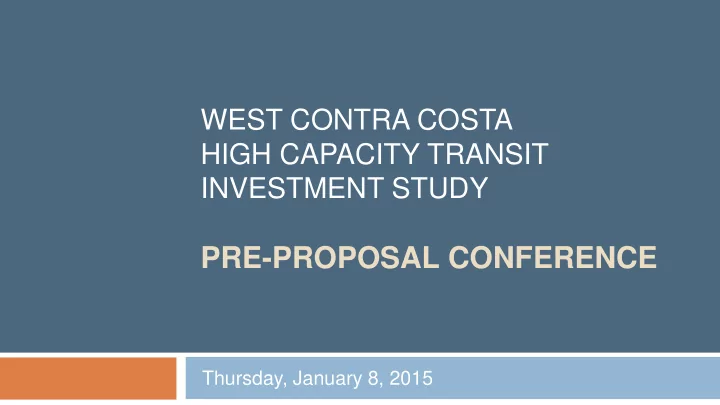

WEST CONTRA COSTA HIGH CAPACITY TRANSIT INVESTMENT STUDY PRE-PROPOSAL CONFERENCE Thursday, January 8, 2015
Agenda Introduction Schedule Summary of Scope of Work DBE Goal RFP Submittal Requirements Selection Criteria and Evaluation Questions, Answers and Process
Introduction Impetus for Study Improving high capacity transit is a long held policy goal Traffic congestion within I-80 Corridor Public interest in major transit improvements Possible extension of Measure J sales tax measure
Introduction Key Partners and Participating Agencies West Contra Costa Transportation Advisory Committee (WCCTAC) Contra Costa Transportation Authority (CCTA) Metropolitan Transportation Commission (MTC) Bay Area Rapid Transit (BART) AC Transit Western Contra Costa Transit Authority (WestCAT) Capital Corridor Water Emergency Transportation Authority (WETA) Cities (El Cerrito, Richmond, San Pablo, Pinole, Hercules) Contra Costa County
Introduction Study Funding Organization Contribution Source WCCTAC $300,000 Measure J, 28b CCTA $300,000 STIP BART $300,000 General Fund MTC $100,000 To be Determined Subtotal (Study Budget) $1,000,000 Contingency (WCCTAC) $100,000 Measure J, 28b
Introduction Study Organization Policy Advisory Study Lead Study Management Technical Advisory Committee Agency Group Committee WCCTAC Board X WCCTAC TAC X WCCTAC Staff X X WestCAT X X AC Transit X X BART X X Capital Corridor As needed Caltrans As needed WETA As needed CCTA X X
Procurement Schedule KEY DATES December 18, 2014 RFP release: January 8, 2015 Pre-proposal conference: Final day for Submittal of Questions: Tuesday, January 13, 2015 Proposal Packages due: Noon on Friday, January 30, 2015 February 2-27, 2015 Proposal Package Evaluation: Monday, February 23 and Interviews (tentative): Tuesday, February 24, 2015 WCCTAC Board Approves Contract: Friday, March 27, 2015
Study Schedule Key Milestones STIP funds availablity Scheduled completion of CCTA Expenditure Plan May 2016 Anticipated completion of HCTI Study September 2016-March 2017
Scope of Work Past Studies AC Transit’s ongoing Major Corridors Study AC Transit’s ongoing Comprehensive Operations Analysis BART’s 1983 West Contra Costa Extension Study BART’s 1992 West Contra Costa Extension Alignment Study BART’s 2003 Contra Costa-Solano Rail Feasibility Study BART’s 2014 Vision Plan Capital Corridor’s 2014 Business Plan CCTA’s 2014 Ferry Feasibility Study CCTA’s 2001 / 2015 Express Bus Studies MTC’s 1996 I-80 Corridor Study MTC’s 2007 Regional Rail Plan WestCAT 2013 Short Range Transit Plan WCCTAC’s 1999 Additional West County Train Station Site Evaluation
Scope of Work Understanding West County Markets for Transit Document Existing and Planned: Transportation Network Land Uses Mobile Device Data (e.g. AirSage) Travel Market Analysis Southbound AM expected for primary analysis Other and untapped markets also should be included
Study Area
Scope of Work Developing Alternatives Conceptual Alternatives Multi-modal Station locations and access Evaluation of Alternatives Criteria Development Preliminary Screening Ridership Modeling Final Screening May result in multiple final alternatives
Scope of Work Public Outreach Diverse array of stakeholders Creative, Effective and Interactive tools Web page Social media Workshop/meetings/open houses Held in various cities within sub-region
Scope of Work Costs and Funding Feasibility Cost Estimates Preliminary Screening: order of magnitude Final Screening: capital and operating costs for each final alternative Funding Options for Final Alternatives Identification of Funding Sources Financial Model Cost Parameters Risk Analysis New Starts/Small Starts Evaluation
8% DBE Goal Analysis used new (2012) Local Assistance methodology. DBE goal based on total forecasted contract value with Caltrans-specified adjustment factor applied Independent cost estimate identified two sub-consultant opportunities: Public Participation Funding Options Need not use the same sub-consulting opportunities Other contract tasks may be used, but must meet the goal or demonstrate a good faith effort.
RFP Submittal Requirements 7 Hard Copies plus 1 Electronic 25 Pages Max. Transmittal Letter with Indication of Compliance or Issues with Professional Services Contract Project Understanding Management Plan and Schedule Qualifications and Experience References Resumes Project Budget (in sealed envelope) Federal Forms
Selection Criteria and Process Selection Panel will review and rank all proposals Evaluation Criteria Demonstrated ability to manage project scope, schedule, budget and deliver projects expeditiously Qualifications and experience of key project team members and firm Demonstrated experience with transit corridor studies involving multiple modes Clear understanding and creative approaches to project’s tasks Satisfaction of previous clients Interviews - TBD
Questions and Answers Process Email notices to interested parties will be sent if there are addenda to the RFP. Any addenda will be posted on the website. All responses to questions will be posted on website: Periodically check for new information WCCTAC website: www.wcctac.org
Questions Received to Date Should the Federal Forms in Attachment A be filled out by the prime only, or all members of a team? Sub-consultants must complete all forms except those pertaining to the DBE commitment (so everything except 10-O1, 15-H, 10-O2, and 17-F). Should the Project Budget be submitted in a cost plus fixed-fee (CPFF) format? Yes. Reimbursement contract type with a not-to-exceed budget and possibly task orders. For costs, include fully burdened rates (direct labor costs, indirect, travel, benefits, and other direct costs) and fee. Do you have a Project Budget template you’d like us to use? No
Recommend
More recommend